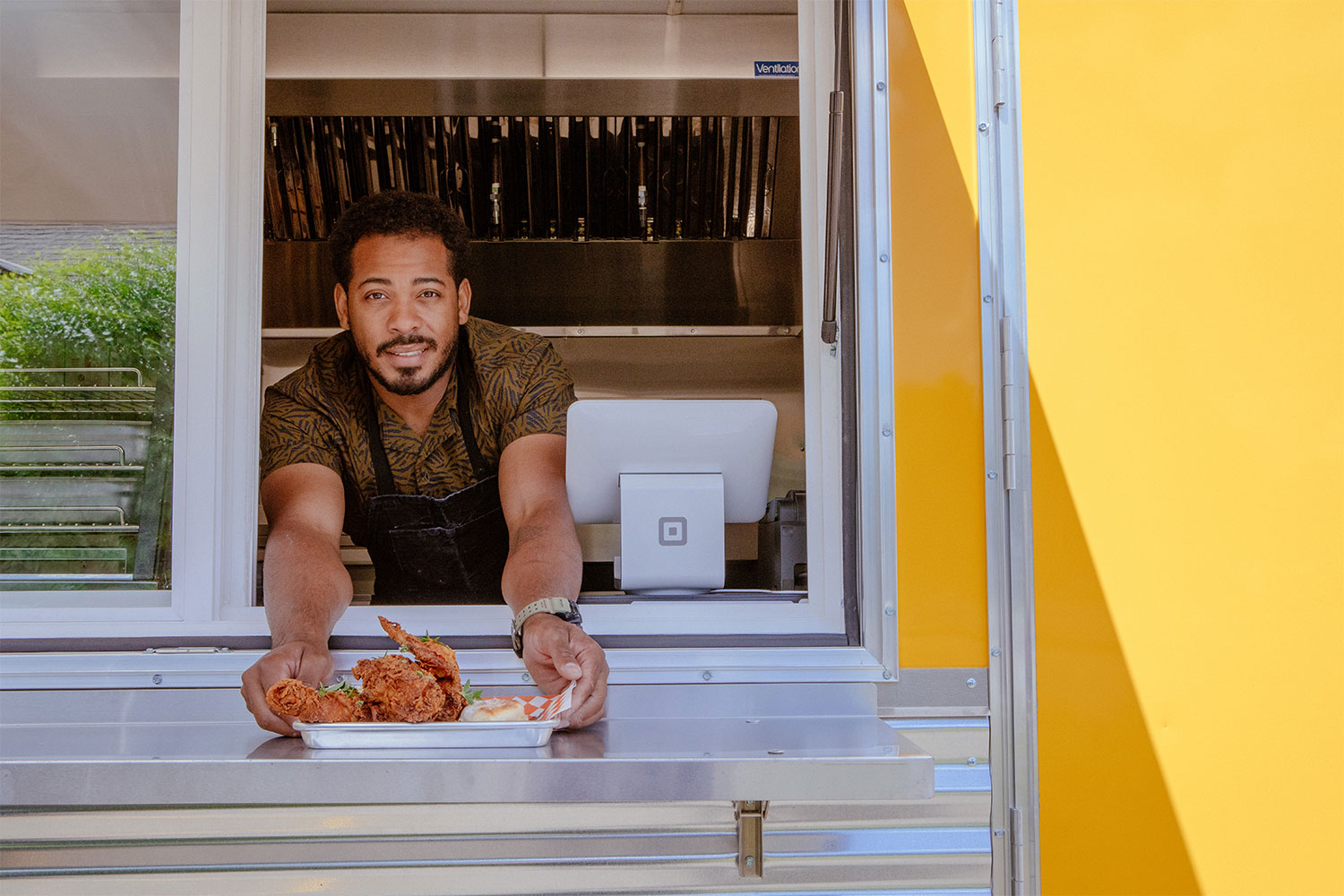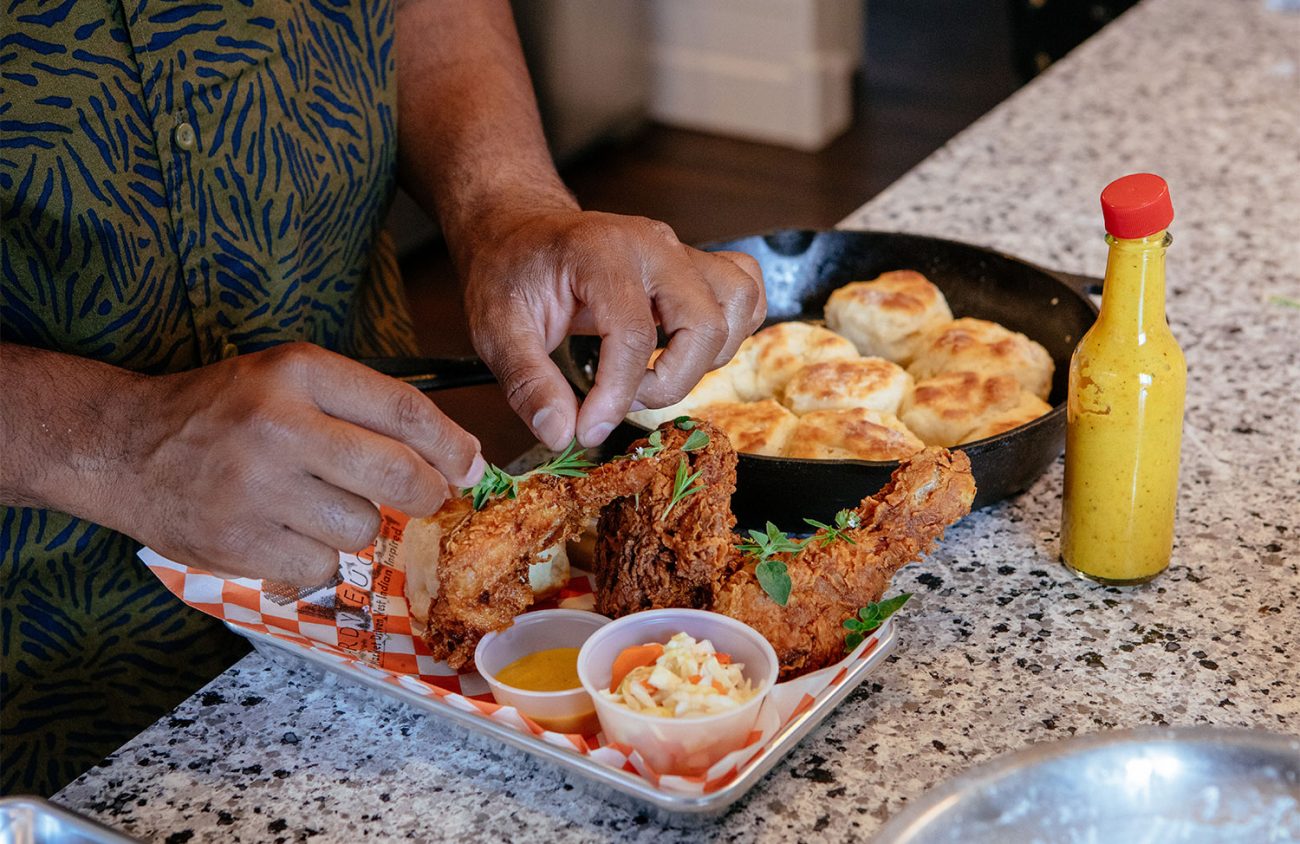The stereotype that Black people love fried chicken developed deep in U.S. history, says chef and Yardy Eugene owner Isaiah Martinez. It started after emancipation when Black people continued to face systematic oppression but, over time, created professional success. One of the trades that allowed them to financially support themselves was selling fried chicken, Martinez says, but this prompted white backlash.
As the Black community grew stronger, “propaganda would come out and there would be these weird images and depictions of Black people and fried chicken, kind of defacing the product so that there wouldn’t be larger support, and so you would feel demeaned in the process,” he says. “That’s what we’re still going to this day. We still get to pick and cancel things that we don’t want to be associated with.”
Enlarge

Photo by Todd Cooper
Serving West Indian food — dishes from the Caribbean — from his new food truck, Yardy Eugene, Martinez works to celebrate Black culture through food and give marginalized people a path into cooking careers. Kitchens are predominantly white and male, he says, and customers put European foods, like Italian and French dishes, on a pedestal, while assigning a lower value to foods from the cultures of Black and Brown people. He wants to change this dynamic.
Martinez currently sells his food online and out of his newly-built mustard yellow food truck at ColdFire Brewing. One of his primary dishes is a chicken meal: skillet-fried chicken that comes with a salad, a biscuit and pepper sauce. The other is doubles, a vegan dish (with a gluten-free option) consisting of two pieces of fried flatbread called bara, topped with chickpea curry, chutney and fresh herbs.
In the Caribbean, people cook with lots of spices both for flavor and to preserve food in a hot environment without enough refrigeration. Of course, Martinez has plenty of refrigeration, but his food reflects this tradition of rich flavor, he says.
He hopes these dishes, cooked with ingredients from the Northwest, will help elevate Caribbean food, he says, and that Yardy Eugene will help combat the lack of diversity that Martinez has experienced in kitchens throughout his career.
Enlarge

Photo by Todd Cooper
Martinez has known he wanted to be a chef since he was 17. At his vocational high school in upstate New York, he picked a cooking track to avoid taking algebra and ended up loving it. “It was driving my education,” he says. “I got all my other grades up because you couldn’t have bad grades to be in it.”
At 18, his father kicked him out of the house, and he moved to California where his mother lived. As soon as he got to San Francisco, he applied to the International School of Culinary Art where he earned a bachelor’s in hospitality management and worked at several well-established restaurants like SPQR and A16, where “the chefs were like celebrities,” he says.
In his cooking jobs, Martinez quickly noticed a lack of women and Black and Brown people in kitchens. After hours, restaurant staff in the Bay Area frequented certain bars — the ones that stayed open after restaurants close, until 4 or 5 am — and Martinez would meet other people who were underrepresented or tokenized at the restaurants where they worked.
“That’s when the dream really started to come alive in my mind where I was like, OK, I definitely want to open a place where there’s more people like me or at least there’s a sanctuary for people like me,” he says.
Working at different ethnic restaurants in California, Martinez also noticed a discrepancy in the value customers place on different cultures’ foods. As a sous chef at A16, a high-class Italian restaurant, he made a comfortable living. “Pasta is easy,” he says. “It took three hours to make sausage for 300 people.” But while working at a Chinese restaurant, it took three days to make a traditional dish that sold for $8. The restaurant ended up closing, he says, because people thought the food was too expensive.
Regardless of ingredient costs or the time it takes to cook something, customers often put Western European foods on a pedestal and are willing to pay more for them, Martinez says. Food from the cultures of Black and Brown people, though, are perceived as street food or snack food that should be cheap — even if it takes more money and skill to make.
“I know the math, I know what goes into it. It actually doesn’t make any sense,” he says. “It’s all perception. It’s all what we think something is worth.”
Meeting other marginalized people in industry bars, he started to realize “how much I’ve sacrificed of my time and my life” elevating only European foods, he says. “I put everything into teaching myself about French culture, teaching myself about Italian culture, and I should really try to figure out a way to do this for my culture.”
Martinez moved to Eugene a few years ago and started working at Marché. After doing a pop up to celebrate Black History month in 2019, he decided to sell West Indian food more regularly. He hopes to own his own brick and mortar restaurant, but in the middle of the pandemic, starting with a food truck seemed like a more practical move, he says, so Martinez started Yardy Eugene. He uses “Yardy” to describe anyone from the West Indies, taking back the sometimes derogatory term and using it in a positive way.
One of Martinez’s goals with Yardy Eugene is to create an environment where women and people of color feel welcome and can learn skills like negotiation that are needed to thrive in the restaurant industry.
He also hopes to elevate Caribbean food by cooking and presenting it well so that others can enjoy it and people of all races will value Black culture more, he says. He anticipates that, as the food truck takes off, other restaurants in Eugene will start serving similar foods, like fried chicken sandwiches. “To me, that’s celebrating Black food,” he says.
While he expects some pushback from people who don’t understand his intentions, he says he’s excited to share his food with Eugene.
“I’m trying to tell a story,” Martinez says. “I think that when you do food and you’re trying to tell a story, it’s kind of hard to fuck it up because you have something to work for.”
Yardy Eugene is at Coldfire Brewery, located at 263 Mill Street, from 5 to 8 pm. Thursday through Sunday. Visit YardyEugene.com for more information.
